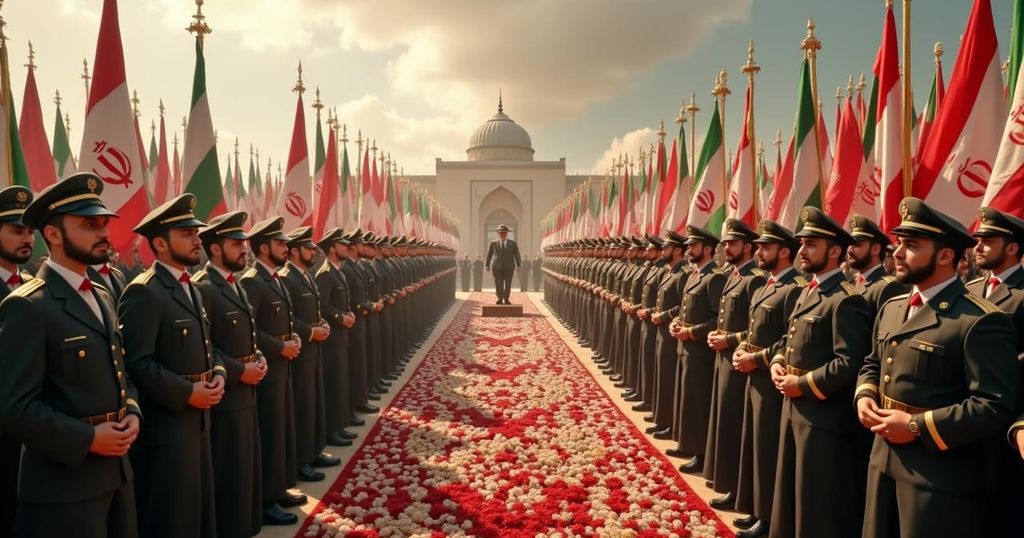Iran and Iraq plan to hold funerals for General Abbas Nilforushan, killed in an Israeli airstrike that also claimed Hezbollah’s chief, Hassan Nasrallah. Following his burial in Isfahan, Iran retaliated with missile strikes on Israel, prompting threats of a deadly response from Israeli officials. The funerals will take place in significant cities and are emblematic of escalating tensions in the region.
Iran and Iraq are set to conduct funeral services for General Abbas Nilforushan, who was killed in an Israeli airstrike alongside Hezbollah leader Hassan Nasrallah. This information was reported by the news agency affiliated with the Islamic Revolutionary Guard Corps (IRGC) on Sunday. General Nilforushan, a prominent figure within the IRGC’s Quds Force, was fatally struck during an airstrike targeting southern Beirut on September 27. The IRGC confirmed on Friday that his remains had been recovered from the location of the attack, which occurred in an area known to be a Hezbollah stronghold in southern Beirut. Funeral ceremonies in Iraq are scheduled to occur in revered cities Najaf and Karbala on Monday, after which General Nilforushan’s body will be transported to Iran’s sacred city of Mashhad. Subsequently, a further ceremony will be held at Imam Hossein Square in Tehran on Tuesday, culminating in his burial on Thursday in Isfahan, his birthplace, as reported by the Sepah news agency. Following these events, Iran launched a retaliation strike on October 1, firing approximately 200 missiles towards Israel in response to the deaths of Nasrallah, Nilforushan, and Hamas political chief Ismail Haniyeh in late July. Israel has acknowledged responsibility for the airstrike in Beirut but has refrained from commenting on Haniyeh’s reported death in Tehran, where he was present to witness the inauguration of Iran’s new president. In response to the missile attacks from Iran, Israeli Defense Minister Yoav Gallant has indicated that the nation will retaliate, asserting that their counteraction will be “deadly, precise, and surprising.”
The unfolding situation stems from a complex geopolitical landscape marked by ongoing tensions between Iran, Israel, and their respective allies. The recent airstrike that resulted in the deaths of high-ranking officials such as General Abbas Nilforushan and Hassan Nasrallah underscores the high stakes associated with these conflicts. Both Iran and Hezbollah are known for their strong opposition to Israel, and the repercussions of these events are likely to escalate regional hostilities. Moreover, the IRGC, from which Nilforushan hailed, plays an essential role in Iran’s military operations and international influence, particularly in supporting groups opposed to Israel. The interlinked deaths of these influential leaders have prompted significant military responses and retaliatory threats from Israel, suggesting a cycle of violence that could further destabilize the region.
In summary, the planned funerals for General Abbas Nilforushan and Hassan Nasrallah reflect the profound impact of their deaths on the geopolitical dynamics of the Middle East. The situation is exacerbated by retaliatory actions taken by Iran and strong responses promised by Israel, creating an environment of heightened tension. These events illustrate the fragility of the region and the potential for further conflict stemming from these incidents. As successive memorials occur, the world watches closely for reactions that may influence the already volatile landscape in the Middle East.
Original Source: www.voanews.com







